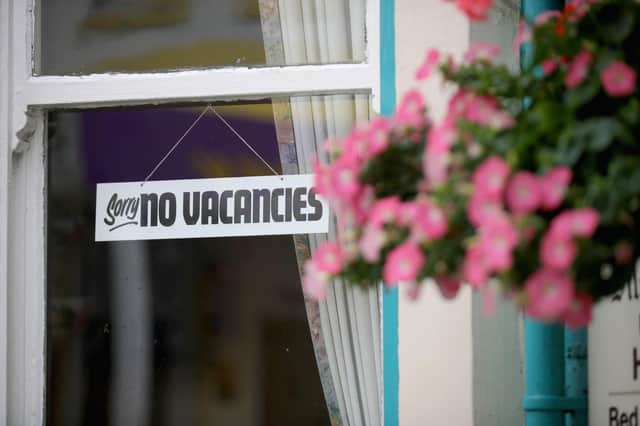SNP has managed to turn B&B owners into a protest movement - Brian Wilson


Correspondingly, it must rank as one of the SNP regime’s more spectacular achievements that it has managed to turn Scotland’s B&B operators into a protest movement, with two-thirds thinking of packing it in rather than submit to the might of St Andrew’s House.
Roadside “no vacancies” signs no more; full Scottish breakfasts no more; modest earnings for hospitable homes with a spare room, no more …. And for what? Does the devolved Government of Scotland have nothing more pressing to legislate upon?
Advertisement
Hide AdAdvertisement
Hide AdI was talking to a friend who is quite typical of the sector. When his mother died, he decided to carry on the B&B business, with three rooms to let. It gives him a modest income and an enjoyable degree of sociability, with guests returning or keeping in touch from around the world. Traditional Scottish hospitality, you might say.
Now he faces costs of £4000 under the licensing scheme and doubts if it is worth the hassle. Two-thirds of B&B operators agree with him but who, exactly, agrees with the Scottish Government? Even the SNP’s Fergus Ewing, the renegade former Tourism Minister, describes the legislation as “draconian” and threatening to “criminalise law-abiding, hard-working people”.
Why on earth B&Bs have been caught up in legislation which was, at the outset, intended to combat homelessness and anti-social behaviour by restricting short-term lets is anyone’s guess. Having heard the Housing Minister, Paul MacLennan, on radio yesterday, I doubt if he has a clue either.
Every country, region or city which seeks to attract tourists needs a range of accommodation, from five-star hotels to humble guest-houses and self-catering flats. In a few tourism hot-spots, the Airbnb phenomenon put genuine pressure on the housing market and it was reasonable to give local authorities powers to address it.
However, that proposition grew arms and legs in Holyrood and emerged as something quite different. Proportionality should be a feature of any legislation and what is now being implemented, with a deadline weeks away, is out of all proportion to any issue it seeks to address or cannot be dealt with through existing regulations.
Edinburgh, which is exceptional, is trying to limit short-term lets but their experience confirms it is a lot easier to identify a problem than find a solution which is legal, fair or workable. It’s for sure that an 80 per cent drop in Airbnb properties will not translate into a corresponding increase in affordable housing for rent. But it will certainly damage Edinburgh’s economy.
The solution to a housing shortage does not lie in outlawing Airbnb. It involves building more homes – either within the social rented sector or by encouraging developers to meet demand, both urban and rural. If Holyrood was a more serious place, there are actions which could be taken to facilitate these outcomes but they would require a degree of radicalism and vision which simply does not exist.
The Glasgow Labour MSP, Paul Sweeney, who champions inner city development, recently pointed out that the population of Manchester city centre has more than doubled in a decade while his own city’s remained static. Derelict sites lie empty for decades and rent controls have added a new layer of deterrence to investment.
Advertisement
Hide AdAdvertisement
Hide AdIt’s one thing to protect tenants from exploitative landlords which we can all endorse. However, there seems to be no capacity to deal with a genuine issue without turning it into a blunt instrument with entirely perverse effect. The collapse of a £200 million development to build 1500 homes on a long-derelict site in Glasgow’s High Street has become a case in point.
The chief executive of Get Living, which builds homes to rent, said: “When I go to (my investors) and say I want £200 million to undertake a scheme in Glasgow and the fundamentals are really strong but the top-line revenue can’t be controlled by us, it’s actually controlled by government, and can I have the same £200 million for the same project in Manchester or Leeds, it’s a really short conversation”.
By comparison, short-term lets are a side-issue – as Mr Sweeney puts its: “Probably to keep the Greens happy, they have embarked on a culture war against short-term lets but without any evidence of beneficial outcomes for people who need homes”.
In rural areas, huge swathes of Scotland are excluded from the potential to provide housing because they are under ownership which is deeply averse to having people living on their great acreages. Any Government serious about Scotland’s housing shortage would also be serious about land reform, which the current incumbents certainly are not.
The Highlands and Islands have probably the largest proportion of B&Bs as well as their own share of homelessness. Deterring the former will do absolutely nothing for the latter and attacking Airbnb also misses the point. The alternative would probably be for most of them to become holiday homes.
Indeed, it’s ironic that, in these places, a long-established and uniquely Scottish system of regulation is in a state of collapse. Crofting tenure used to allow people to remain and build homes. Now the sale of tenancies for vastly inflated prices has, to all intents and purposes, become deregulated – an issue many times more relevant to housing shortages than licensing B&Bs and ignored for 16 years by the SNP.
All of these issues are entirely devolved. If there is serious interest in addressing Scotland’s housing shortfall, let them come forward with a landmark piece of legislation which clears the way to building more homes, urban and rural. By comparison, driving Bed and Breakfasts out of business symbolises the small change of political mediocrity.
Comments
Want to join the conversation? Please or to comment on this article.